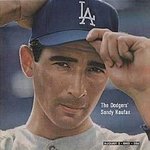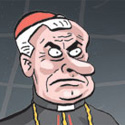|
 The New Order: Last Days of Europe (hereafter abbreviated as TNO) is a mod for Paradox’s Hearts of Iron IV, also known as the endpoint of the many excellent Paradox Mega-Let’s Plays on this forum. As you might have gathered from the thread title and the logo above, it takes place in an alternate history where Germany won World War II. Unlike vanilla HoI4 and other conversion mods like Kaeiserreich, TNO is far less focused on combat and way more focused on managing the internal dynamics of a country while reacting to world events. I don’t know if it’s a “total conversion” mod but if not it’s got to be pretty close as I’d say TNO is much closer to a Choose Your Own Adventure story than a military simulator. As such, this is going to be a very text heavy LP. Look forward to a lot of reading. This is also going to be a participatory LP. I will be soliciting feedback on what paths to take from the thread; sometimes what we do next will be put up for a vote, sometimes it’ll be whoever provides the best argument. 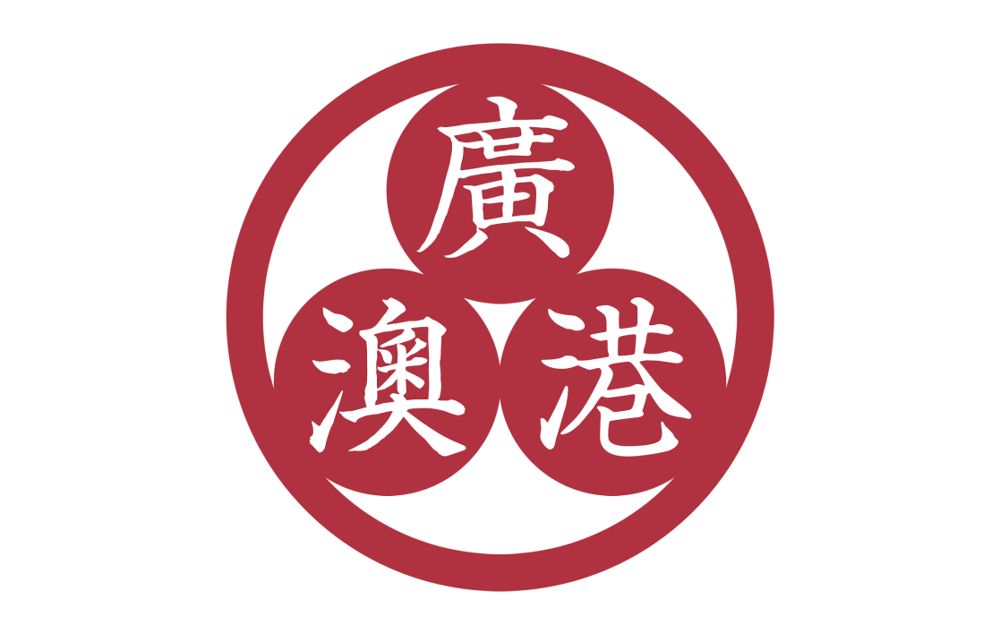 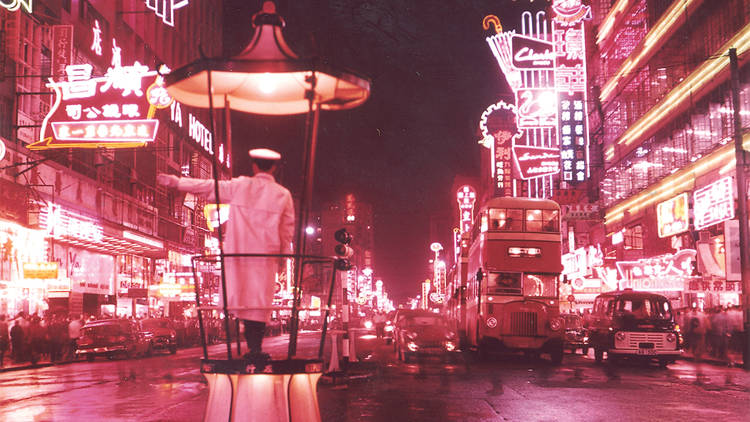  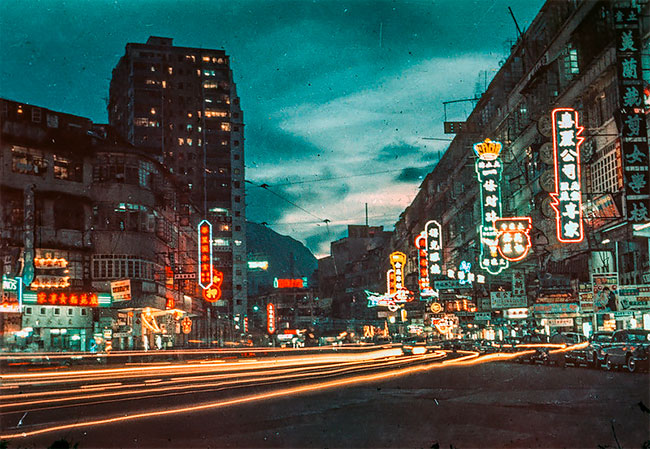  For this (first?) run, I will be playing the State of Guangdong.  quote:A People Unmoored The focus of the most recent major update “Silicon Dreams,” Guangdong has a lot of content and multiple paths to take. We can leave this place a lot better than we find it; but sometimes it’s fun to play the bad guy. Thread Rules:
TABLE OF CONTENTS Prologue: The State of the World Dramatis Personae Chapter 1: January 1962 Chapter 2: February - March 1962 Chapter 3: March - June 1962 Chapter 4: June - September 1962 Chapter 5: September - November 1962 Chapter 6: November 1962 - March 1963 Chapter 7: March - June 1963 Chapter 8: June - August 1963 Chapter 9: August - October 1963 Chapter 10: October - December 1963 Chapter 11: December 1963 - February 1964 Chapter 12: February - May 1964 Chapter 13: May - December 1964 Chapter 14: January - May 1965 Chapter 15: June - December 1965 Chapter 16: January - May 1966 Chapter 17: May - October 1966 Chapter 18: November - March 1967 Chapter 19: March - May 1967 Chapter 20: May - October 1967 Chapter 21: October - December 1967 Chapter 22: January - April 1968 Chapter 23: May - November 1968 Chapter 24: November 1968 - April 1969 Chapter 25: April - September 1969 Chapter 26: October - December 1969 Chapter 27: January - November 1970 Chapter 28: November - December 1970 Chapter 29: January - February 1971 Chapter 30: March - May 1971 Chapter 31: May - June 1971 Chapter 32: June - October 1971 Chapter 33: Four Days in October Chapter 34: October - November 1971 Chapter 35: December 1971 Chapter 36: January - February 1972 Epilogue, Part 1: March - April 1972 Epilogue, Part 2: May 1972 Moon Slayer fucked around with this message at 02:33 on Oct 9, 2023 |
|
|
|

|
| # ? Apr 28, 2024 06:02 |
|
The State of the World as of January 1, 1962 Asia   quote:The Dai Toa Kyoeiken, commonly referred to as “The Sphere,” is an international organization of independent Asian nations, liberated in the War Against Western Colonialism and Imperialism. At least, that’s the official version. In reality, beyond its few voluntary members, the Sphere is filled with colonial governments in all but name, geared towards serving their Japanese overlords. The Co-Prosperity Sphere combines aspects of an economic union, a political superstructure, a military alliance, and an integration project. Most importantly, however, it serves as a further extension of the Imperial stranglehold.  quote:The sun never sets on the Japanese Empire, or at least it hasn't yet. Reigning over the single largest population of any nation on Earth, the Japanese maintain the largest military, industrial base, and navy in the world. With treaty ports in America and ownership of the Pacific, Japan has gone from a shut-in nation behind the Europeans to the masters of the sea and land. All is not well, however, as the increasingly byzantine Imperial Court constantly undermines the monarchy, and the more Japan uses China's resources, the more their grip on the colonies slip.  quote:Ino Hiroya is not a popular man. Originally a mere representative in the Imperial Diet, Ino skillfully maneuvered his way through the byzantine affairs of Japanese politics to help overthrow Tōjō Hideki himself, and then later his political rival Kido Kōichi. But things are never so simple. To bring down such political beasts, Ino had to cut a few backroom deals. More than a few, really. And while those connections initially seemed useful, the obligations on Ino's end have piled up, and he has been forced to work for various special interests, rather than the people of Japan.  quote:The hopefuls who lit the fuse against the Qing in Wuhan would die with the Republic just 30 years later as it was snuffed out by the Japanese in Chongqing. The new republican government over China claims to be the legitimate successor to the KMT's Republic but all up and down society know that this is not true. In reality, the ROC of 1962 is a virtual colony of the Japanese, serving to put food on Japanese tables and resources for exploitation. But there are some still who see light where others don't, who see the potential in this situation. China has known only peace and stability since the War of Resistance and Japanese investments have kickstarted the Chinese economy. Perhaps this, paired with Gao Zongwu's planned Five Modernizations program, could propel China beyond being a mere servant.  quote:If there is one man that embodies the centuries of Chinese humiliation, it is Gao Zongwu. Born in the dimming light of the Qing, Gao began life awkwardly. Being shrewd, frail, and often plagued from chronic bouts of tuberculosis, his future was made brighter by the privilege of studying in Japan. Upon his return to Nanjing, Gao found work at the city university, where he taught political science. Using his background in both countries, the sickly but savvy young man quickly garnered a reputation for breaking the mold when it came to Sino-Japanese relations.  quote:Since the establishment of its status as a state, the Manchurian government has always relied on Japanese means to accomplish its ends. The Japanese bureaucracy, as vital an organ to the state as the heart to the human body, oversees the economy. Corporations across the sea establish themselves in Asia's third-largest industrial nation. Yet, this cooperation is rarely done in good faith. The Kwantung Army and the Manshu Somucho (General Affairs Agency) hold a predominant role in Manchuria's political society, and the State Council is nigh powerless without Somucho's "benevolence." The corporations, dominated by Mangyō, are rarely benign: twisting Manchuria's laws against itself, all in the name of profit. Currently, the state is in equilibrium. In order for anything to change, something must give.  quote:Once the son of heaven, Puyi's life has been a long descent into hell. Chosen by the Empress Dowager Cixi herself a day before her death, he would serve as little more than an ineffective child emperor in the dying days of the Qing dynasty. Forced to abdicate by the Empress Dowager Longyu under pressure from the leaders of the Xinhai Revolution, Puyi grew up in the Forbidden City, temporarily left to him by the newly established Republic of China. There, he married Wanrong of the Gobulo clan, and became close friends with her younger brother, Runqi. In 1924, the court was expelled from the Forbidden City, and forced to eventually take refuge at the Japanese Concession of Tianjin, taking his life in a decidedly pro-Japanese direction.  The Philippines is locked in a 3-way war between the West-supported Free Philippine Republic in the south, the Japanese-supported Second Philippine Republic in Manila, and a Communist insurgency in the north.  quote:The 25th Army, the proud upholders of Shonan! On paper, at least. In practice, the 25th is nothing but a shell of its former self, the 10 years of constant fighting back and forth with rebels have whittled the once proud army into an undermanned, underfed, and underequipped force. What keeps it going is the supplies from Japan itself, and the weariness of their enemies. For good or bad, the 25th needs to win, as another loss will be the final nail in its coffin.   quote:The father of the Indonesian nation, and the leader in its struggle for Independence: all this, and more, can be used to characterize Soekarno, the President of the Indonesian Republic. While the reality, as often, is slightly more complicated, such a description is however not that far from the truth. North America  quote:The Organization of Free Nations is, first and foremost, a mutual defense alliance between countries with liberal and democratic inclinations. It comprises signatories of the San Francisco Charter, who (barring some exceptions) are expected to “maintain and develop their individual and collective capacity to resist armed attack” in accordance with Article 3 of the aforementioned document. A council of representatives from every member state, each entitled to one vote, manages the alliance’s daily and long-term affairs. “Member states” refer to countries which maintain political, economic, and military autonomy from the United States. The alliance’s first members were Canada, Australia, New Zealand, and Iceland.  quote:When America joined the Second World War, her support came too late to save her allies. The United States performed admirably, humbling the Kriegsmarine in the Atlantic and beginning to turn the tide in the Pacific, but the invention of the atom bomb ended any hopes of American victory for those few remaining Allies. Now, twenty years later, America stands divided. While the great American Depression is slowly ending, the American political scene sits in chaos. The government remains locked between the uneasy Republican-Democratic Coalition and the National Progressive Pact, a failing union of America's progressives, socialists, and authoritarians. With the Civil Rights movement greatly shifting the political sphere, many predict that the 60's will herald the greatest threats America has ever faced.  quote:Richard Milhous Nixon is a complicated figure. Originally a Representative, and then Senator from California, he rapidly rose through the ranks of Congress through skilled political maneuvering. During his time as a Senator, Nixon worked closely with Joe McCarthy in carrying out the Grey Scare, working to root out suspected fascists in government. And while he didn't share the spotlight to the same extent as McCarthy did, nobody doubts that Nixon is still an anti-fascist crusader through and through.   Europe   quote:The Einheitspakt, referred to in international circles as the Unity Pakt, is the Pan-European alliance of the Nazi order. Gone is the old order of decadent states and degenerate corruption - in its place stands now European Brotherhood and Unity, guided by the German hegemon. The Pakt consists of many charters, detailing the economic, military, and political relations of its many member states, each ultimately designed in German interest. With its unparalleled control over European affairs, the Pakt is truly the linchpin of European destiny - and the Reich, the Master of Europe.  quote:Once humbled by their failures in the Weltkrieg, Germany once more rose to prominence with the leadership of Adolf Hitler in the 1930s. Thanks to the failures of the Allies, WW2 has ended in complete German victory.  quote:How does one begin to define Adolf Hitler, Führer and Reichskanzler of the Greater German Reich, the undisputed tyrant of 19 countries, the architect of Welthauptstadt Germania, Supreme Commander of the Wehrmacht, Führer of the National Socialist German Workers' Party, and Time Magazine's Man of the Year in 1938, 1946, and 1961?  quote:France seems engulfed in a great torpor, as the once-superpower stands forever chained to a mountain, with the German Eagle coming to eat its bloated liver every day. While the adoption of the Maréchal Pétain's constitution established the groundwork for a democracy, Pierre Laval's consolidation of the political landscape into the Parti National and subsequent ascent to the Presidency salted the earth in which the seeds of freedom had been sown. The 1950s were a sad decade for France, and, as the new decade slowly sets in, most of France seems to be resigned to a dire fate. Or is it?  quote:In his ascension to Presidency, Jean-Louis Tixier-Vignancour is the quintessential representation of the current catastrophic deadlock the French State finds itself in. Elected to the long-defunct National Assembly of the Third Republic in 1936 and the subsequent French State, he is as loved as he is hated in the spheres of French Politics.  quote:The SS-Ordensstaat Burgund is the youngest state in the Einheitspakt, cobbled together with lands from the French and Belgian territories of the Reich in order to placate Reichsführer-SS Heinrich Himmler. During the West Russian War, Himmler attempted to launch a coup against the ailing Führer Adolf Hitler, whom Himmler saw as a decrepit fool who was driving the Reich into chaos. However, Hans Speidel and the Wehrmacht were able to crush the coup, forcing Hitler to find a punishment for his once-loyal follower. It came in the form of the Ordensstaat, a white elephant that would hopefully keep the SS too busy managing in order to plot. How wrong he was. Himmler has spent the past several years consolidating his power and ousting anyone in the administration who was not utterly loyal to him, and now he is ready to strike and succeed where he once failed.  quote:Heinrich Himmler has been a loyal member of the Nazi Party for decades, having even joined in the abortive Munich Beer Hall Putsch of 1923. And much like the months following the Putsch, the Reich's failures have left Himmler embittered, disillusioned, and more devoted to his ideology than ever before.  quote:Although American aid came to the English in the World War, it was too late, and for the first time, England was invaded by a foreign power. Her empire stripped away, and with an occupation force ensuring “good order and civility” of the English people, England now faces its darkest hour, with no Arthur to save it. If anything can be said of the British however, it is that they are hard headed, and even now, twenty years later, whispers of rebellion spread.  quote:Alexander Douglas-Home was not a man born into any true power. He served in the Territorial Army to no great success, married his wife Elizabeth in a ceremony of little note, and served as a Member of Parliament with little influence before leaving in 1937 to be an aide to Neville Chamberlain. Though initially serving as Chamberlain's eyes in the House, after he left the Government Home was caught up in bigger problems. He spent most of 1940-1943 in a full cast for the spinal tuberculosis he had removed. Thus Home missed much of the bungling of the war effort by the Unity Government - along with much of the blame, something which proved useful when the Germans invaded.  quote:Italy's recent history is one strung with an impressive sequence of victories and defeats. The minor partner in the European Axis, Italy entered the war playing second fiddle to Germany and performing disastrously in the Balkans - only to win an incredible victory in Egypt. Italy soon found itself ruling over an overstretched empire and a divided nation, the country only managing to counterbalance those strains with its newly acquired oil reserves.  quote:Gian Galeazzo Ciano, 2nd Count of Cortellazzo and Buccari, son-in-law of Benito Mussolini, and Duce of Italy, began his career as a bomber squadron commander during the invasion of Ethiopia, winning two silver medals of valor and returning home a hero. In Ethiopia, he learned valuable lessons about people and leading, lessons which have given him the ability to bring Italy to greatness. After the war ended, Mussolini chose Ciano to be his Foreign Minister, preparing him to be his successor by giving him valuable political experience. As Foreign Minister, Ciano presided over Italian affairs on the world stage, helping her expand during and before the Second World War through both peaceful and violent means. Throughout the entire war, he managed to keep the Germans from dominating Italy, fighting tooth and nail to keep his country as an equal partner with the Reich. And when the time came for peace, Ciano fought even further for the concessions that Italy required to build an empire that spanned multiple continents.  quote:The Republic of Turkey has undergone many triumphs and tribulations over the course of the 20th century, from the dream of secular Republicanism to the early days of the Kemalist revolution and the following years of strife. Turkey had become an empire through war. An empire with a stagnating economy - and an empire tearing itself apart at the seams by 1962.  quote:If Mustafa Kemal was the father of the Turks, then Ismet Inönü is their Godfather. What could suffice, to describe the life of the man whose very whims have defined the policies of nations, armies, and empires?  quote:Not since 1640 has Madrid and Lisbon been united underneath one flag. Yet, fate is a fickle mistress, and not one that takes kindly to those who disobey it. During the Second World War, despite Franco's sympathies towards Berlin, Portugal and Spain remained neutral, albeit not without Spain seizing Gibraltar from the clutches of the dying British Empire. However, as Hitler tamed Europe, so he would try his hand in Africa. With what scattered units they had accrued in the Dark Continent, Germany struck the Portuguese colonies of Angola and Mozambique.  quote:While internationally a divisive figure, it cannot be denied that Caudillo Francisco Franco clawed his way to his position through merit. With the German victory in World War 2, António de Oliveira Salazar of Portugal approached Franco to create a protective union against the Germans. Spain found itself uniting with Portugal in a comprehensive defense-pact-turned nation. Africa     quote:Since there has been a "Free France," Charles de Gaulle has stood at its helm. For more than 20 years, de Gaulle has led the last remaining Free French in a desperate and drawn out battle for survival against the greatest odds. He was once a division commander in the army of the Fourth French Republic, keen to bring reform to their forces. His attempts were made too late however and France quickly fell to the Wehrmacht.   quote:Some say that each Reichskommissariat is but a mirror of its ruler. Indeed, Ostafrika is very similar to Reichskommissar Hans Hüttig: both are dry, pitiless and utterly devoid of humanity.   quote:The pilots of Reichskommissariat Südwestafrika rule the skies even while Africa remains locked in chaos. From the airstrips of Angola, hundreds of German bombers filter in and out en-route to bomb West Africa into dust. From his squadron headquarters, Reichskommissar Wolfgang Schenck rules, treating the natives with a light hand and his duties even lighter. Many have criticized his hands-off attitude and apparent disregard in actually ruling the nation. To Schenck, however, only the skies can provide him solace from the hell that he had a hand in creating, and some whisper that the Reichskommissar is not entirely loyal to the Reich. But from all reports, Schenck remains as loyal as he has ever been: a model hero of German aviation.   quote:Covered by a lush jungle and filled with wildlife that would make all hunters weep in joy, the former Belgian Congo is the richest of all the German colonies. Under the perfect façade, however, lies a dangerous world, far more dangerous than any safari may be. The story behind that big lake is simple: the Germans built a bunch of dams on the Congo River and through poor hydrological engineering ended up creating a huge lake that they didn’t care about.  quote:A monarchy without a monarch and a nation without direction, the Union of South Africa has found itself increasingly struggling to hold back the forces of unrest waiting to tear the nation asunder.  quote:Succeeding his father's position as Baronet of Cape Town, De Villiers Graaff soon entered the ring of South African politics. He had worked his way from the lower echelons, starting his career as a member of the House of Assembly and eventually, his hard work and commitments paid off as he was elected to lead the United Party in '56. It seemed to Graaff that his ascension to power as Prime Minister was dutifully needed and to succeed he had to balance the delicate house of cards and maneuver his way through the system to prevent his nation from tearing itself apart. The Former USSR  Russia and the former territories of Nikolai Bukharin’s Soviet Union lie shattered into innumerable warlord fiefs, petty statelets, and orphaned military formations. Information is sparse and the surviving population is sparser. Moon Slayer fucked around with this message at 05:44 on May 25, 2023 |
|
|
|
Dramatis Personae in the State of Guangdong quote:A decorated IJA officer and former head of the Cabinet Planning Board, Suzuki Teiichi was intimately involved in the construction of Japan's wartime economy and the subsequent economic planning for the Japanese New Order in Asia. An esteemed member of the House of Peers since 1943, Prime Minister Ino has named Suzuki the next Chief Executive of the State of Guangdong in order to use his Chinese experience, military connections, and economic expertise to bend Guangdong's corporations to the will of Tokyo. 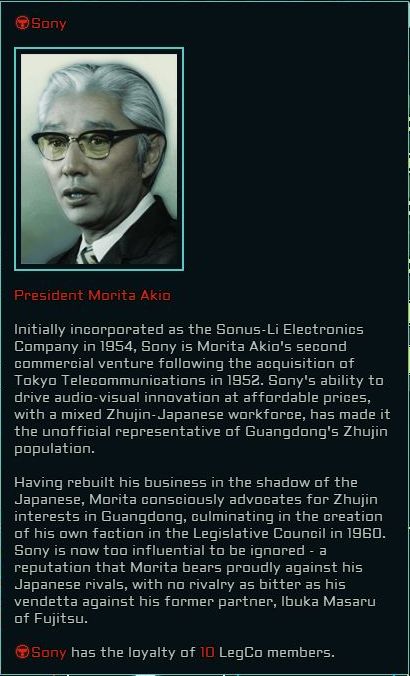 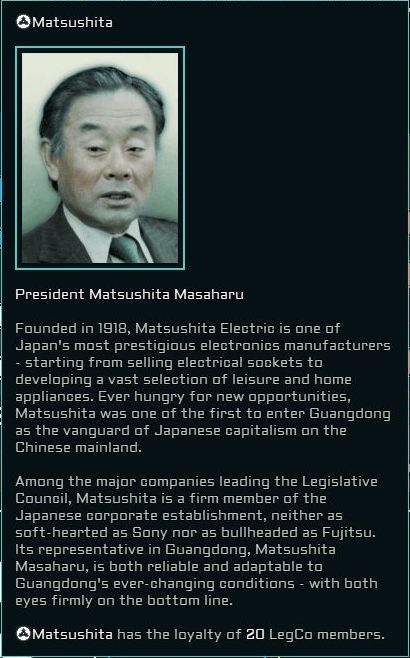     The Kempeitai’s Warden: Miyazaki Kiyotaka Head of the Kempeitai in Guangdong. The Leashed Butcher: Lt. General Nagano Shigeto Deputy commander of the IJA garrison. The Untouchable Crusader: Kamino Satoshi Commissioner of the Independent Commission Against Corruption. The Modern Princess: Yasukawa Yoshiko The only child of a minor Japanese noble, Yoshiko is well educated but sheltered. The Good Cop: Kōsen Hayashi Born Lam Haau-cyun, Officer Kōsen is the model zhujin; fluent in Cantonese and Japanese and despised by both. The Displaced Family: Lee Leong and Mai, and their three children Chun, Hei, and Wai A Chinese family forced to move into Koshu after the land their village was on was appropriated. The Struggling Founder: Yamauchi Hiroshi President of a little-known playing card company called Nintendo. Moon Slayer fucked around with this message at 19:22 on Jul 8, 2023 |
|
|
|
Chapter 1: January 1962 (Future updates will cover more than just one month but I’ll be taking this slower at first because there’s already been a lot of reading I’ve subjected you to and also the mod front loads you with a lot of lore.)  New Year’s Day in Guangdong, 1962. Business as usual.  The business of the state is business, and business is good.   Our first focus, HoI4’s main way of driving events. There will be choices to be made here, but for now we stay on course.  Guangdong neither needs nor has a military, as defense is the responsibility of the IJA garrison. The police do maintain a few “rapid response” forces that must be locally supplied. (Don’t ask why they need artillery or anti-tank weapons; it’s a gameplay thing that won’t factor in.)  quote:BANG. At the sound of the gavel stood Kanda Tatsuya. Fifty-three years old. Chief Marketing Officer of Yamashiro Chemicals, Ltd., Honkon. With his usual booming yet soothing voice, he delivered the contents of the stack of paper in hand unto the rest of the Complex. He talked of skyrocketing numbers, of the shining furnaces of today lining the Kowloon riverside, and the surely indispensable patronage of Morita Akio that "brought them back teeming with life!" Teeming with life, indeed; he smiled, his mind back to yesterday's crate of "shipments" landing at his doorsteps. The Legislative Council of Guangdong is made up entirely of senior Japanese corporate executives with no representation for the actual residents. Nominally nonpartisan, they all nonetheless align behind either one of the largest companies in Guangdong or are loyal to the chief executive himself. We’ll learn much more about the major players in Guangdong later. quote:World News: January 10, 1962 Already the new year starts on a positive note!    quote:World News: January 19,1962 Everyday life in Guangdong continues, contrasting sharply with the extraordinary news of a man on the moon. quote:World News: January 26,1962 Ah, well. This could be an issue. quote:A faint ray of sunlight broke through the gray smog wafting over the factories on the Pearl River, casting a shaft of natural light into Suzuki Teiichi's office. The Chief Executive, welcoming the distraction, followed the beam to the office's floor-to-ceiling windows, surveying the city of Kōshu - formerly Guangzhou - as he lit his third cigarette that morning. 
|
|
|
|
Can Glenn still become president and send men to mars?
|
|
|
|
Let's see how this plays out?
|
|
|
|
samcarsten posted:Can Glenn still become president and send men to mars? Nah, he was removed for a guy who can do something far less possible: bring working national public transportation to america.
|
|
|
|
Looked over this thread a bit. Game seems interesting, but not for me. I like alternate history on occasion, different perspectives are always interesting, imagination can be good or bad… I don’t want to spend time to read the thread right now, so I’m just going to post a bit of praise for it, vote, then move on. This thread looks good thus far, so I have faith it will attain further glory if maintained well. Good luck playing the game or watching the LP, as you prefer. Sorry I can’t stay here. I’m more into other media involving Nazis. Media that takes them down, not sponsors them. Media like… Nazis… I hate these guys. [adjusts fedora, walks off humming the Indy Jones theme]
|
|
|
|
NewMars posted:Nah, he was removed for a guy who can do something far less possible: bring working national public transportation to america. Aw, at least we still have Sablin.
|
|
|
|
I go back and forth on how I feel about this mod. It sometimes seems like the most interesting parts of it, the tense three way cold war, is incidental to the super dystopian fiction aspect. And HoI4 isn't a great narrative medium for that (but also it's not great at cold war stuff since basically all those systems are custom coded by the modders). I've actually never played as Guangdong so I'm down for the LP.
|
|
|
|
I think the mod has some interesting ideas. On the other hand, I don't think the writing is anywhere close to being good enough to maturely deal with the topics of Nazism and fascism. This word gets thrown around and has been made almost meaningless, but TNO is honestly pretentious, and I don't even mean that in a pejorative sense. I guess that's the result of a bunch of early 20-something and teen HOI4 players left to their own devices writing about a world historical tragedy and unspeakable, shattering evil lmao
tatankatonk fucked around with this message at 01:19 on May 26, 2023 |
|
|
|
So what the plan for Guangdong?
|
|
|
|
That'll be for the thread to decide. Update and first vote coming in a few hours.
|
|
|
|
Chapter 2: February - March 1962 The month starts with the Chief Executive preparing to travel to Tokyo for a meeting with Prime Minister Ino. quote:World News: February 2, 1962 The situation in Europe remains unsettled to say the least.  Not that the situation at home is any more stable, at least beneath the surface. Guangdong is sharply divided along all societal lines, and Chief Executive Suzuki walks a tightrope between the various groups.    In addition, the Guangdong Police, Kenpeitai, Triads, and Yakuza vie for dominance not just in the three cities but in the countryside as well.                        Wealth always flows upward, but in the Sphere, Guangdong isn’t even at the top.  One final balancing act. Keeping our relations good with Japan and China is paramount, but given their situation most decisions we make will be mutually exclusive as to who approves. And corruption – ever present – will need to be kept low. But not too low; there are some things that will need to be done for the greater good that can’t be accomplished without getting our hands dirty.  Not one week after their meeting in Tokyo, the Japanese Prime Minister pays a sudden visit to Koshu to let us know that we are now in the arms business.  Profiles of the four tycoons have been added to the “Dramatis Personae” post, #3 in this thread.  quote:World News: March 7, 1962 The OFN, focused entirely on fighting facism, collectively shrugs at a communist takeover in the Caribbean. quote:World News: March 11, 1962 Much more concerning and much closer to home is the situation in the Empire of VIetnam.   But enough about that; business waits for no man, and we have a choice to make. The tycoons of Guangdong will frequently come to us to decide which product to subsidize. It won’t always be weapons; hopefully not, in fact, given the quality of these first offerings. But a successful product will bring more than just money to a company – it will also bring influence. A highly successful product launch can even sway the loyalty of members of the Legislative Council. So, for the thread’s first vote: which rifle will we produce and send for testing in Malaysia: Fujitsu, Mastushita, or Sony? Moon Slayer fucked around with this message at 04:26 on Jun 4, 2023 |
|
|
|
That Sony rifle seems pretty practical.
|
|
|
|
The Fujitsu rifle is too experimental. It also looks too expensive. The Matsushita rifle's ammo is too specialized and in the field will be unreliable if supply lines are strained. Thus, the practical and adaptable Sony rifle appears to be the clear choice.
|
|
|
|
Is this one of these HOI mods for wehraboos to fulfill their fantasies about Third Reich ruling the world? At least it seems to have other interesting factions beside muh nazis.
|
|
|
|
No, in fact it's the opposite. The mod was intended to show that even if Nazism won, the resulting order would be miserable, dystopian, and unstable, because fascism is a nihilistic death cult. The current dev team working on it is trying to make it more 'realistic' and the old dev team was much more wackier in tone, but it's never had the goal of portraying the axis powers in a positive light
|
|
|
|
Chinese reaching the 25th? Unlikely! Soldier's lugging around a functional battery in the Jungle? Laughable! That mad scientist Ibuka's next attempt will strap a portable nuclear accelerator to infantry. No no, only the finest products from the greatest city (Osaka!), will do. Matsushita can only bring profit. And possibly victory but that's someone else's concern.  The whole family can see the truth of this. Let's glide on the cool, air conditioned breeze to the right choice. Arbite fucked around with this message at 12:14 on May 26, 2023 |
|
|
|
Szarrukin posted:Is this one of these HOI mods for wehraboos to fulfill their fantasies about Third Reich ruling the world? At least it seems to have other interesting factions beside muh nazis. I wouldn't play it, or show it off via an LP, if it was.
|
|
|
|
What our boys in the jungle really need are some quality wunderwafte that resulted from a whole loving lot of amphetamines! Oh, right...we're playing a Japan-adjacent faction, I suppose they were more practical when it came to weapons. The Sony rifle seems very practical and adaptable to different ammo. Sometimes it's hard to supply soldiers in the jungle, after all.
|
|
|
|
Oh boy. This is quite the undertaking. Let's all agree to make this corporate dystopia at least slightly less lovely?Szarrukin posted:Is this one of these HOI mods for wehraboos to fulfill their fantasies about Third Reich ruling the world? At least it seems to have other interesting factions beside muh nazis. As for the weapon, go with Sony for being the only choice that's even remotely practical under the current circumstances.
|
|
|
|
Szarrukin posted:Is this one of these HOI mods for wehraboos to fulfill their fantasies about Third Reich ruling the world? At least it seems to have other interesting factions beside muh nazis. The history of Nazi Germany in this game is ridiculous mega projects that go horribly wrong, the Nazis constantly sniping at eachother and eventually likely plunging the world into nuclear Armageddon. One of them literally just goes hunting instead of dealing with politics. It is not at all fond of the Nazis.
|
|
|
|
My vote is for Sony for something practical. We don't have the money or research space to waste on experimental thermal and starlight scopes, or a loving needle gun.
|
|
|
|
The Sony gun is loving boring, voting weird battery powered night vision ninja gun come on, yall, this is a "Nazis won" alt history let's get some dumbass wunderwaffen going.
|
|
|
|
GunnerJ posted:The Sony gun is loving boring, voting weird battery powered night vision ninja gun come on, yall, this is a "Nazis won" alt history let's get some dumbass wunderwaffen going. This poster gets it
|
|
|
|
Fujitsu The first rule of arms marketing isn't "make something useful," its "make something marketable"
|
|
|
|
Sony!
|
|
|
|
Hello yes I'm voting for the Fujitsu ninja gun.
|
|
|
|
Matsushita Bullets should be left in the 1940s, where they belong.
|
|
|
|
Splitting the "cool gun" vote... 
|
|
|
|
I really like the lore/fluff parts like the short stories about workers, do all playable factions have so much of them? Also you didn't mention South and Central America in your The State of the World summary, are there no playable factions there?
|
|
|
|
Szarrukin posted:I really like the lore/fluff parts like the short stories about workers, do all playable factions have so much of them? South America has loads of content in this mod (unlike vanilla HOI4, which is fairly limited in that regard), though not much of it is likely to be directly relevant to Guangdong.
|
|
|
|
Sony
|
|
|
|
Szarrukin posted:I really like the lore/fluff parts like the short stories about workers, do all playable factions have so much of them? Yeah the one thing that sets TNO apart from a lot of other alt-history mods is that there are a LOT of these first-person narratives that show you what life is like in the country you are playing. Some countries have more than others and they tend to skew heavily towards the leaders, but pretty soon we'll be introduced to a few recurring "man on the street" characters whose lives will be directly affected by the choices we make. Central and South America, as well as the Caribbean, have a lot of content! The only reasons I didn't include them were that 1: they are mainly doing stuff that is regional, but mainly 2: I hit the character limit with that post and actually had to take a few countries out. Sony's offering appears to be the clear favorite. Update later today. e: if anybody wants a quick overview of how a particular country is doing, just ask and I'll try and accommodate! Only thing I'd prefer to avoid is any of the Russian statelets; there are way too many and they all have unique content and I might want to show one of them off if/when I finish Guangdong. Moon Slayer fucked around with this message at 18:08 on May 28, 2023 |
|
|
|
Establishing how poo poo the common person is actually going through this is extremely important for any bad history timeline that doesn't just end up wanking over how strong and scary the governments are personally and is the usual flaw of most of them.
|
|
|
|
I like them a lot because they give you a more hands-on idea of the real consequences of your decisions. If it's just a throwaway line in a focus description and abstract modifiers like "+5% stability" or whatever, you don't really have the context to fully understand what it means. But you can relate to John Everyman cheering with his mates at the pub when a corrupt official gets removed.
|
|
|
|
Sony! Sure we're building them to sell to the army now, but think of the wider market people! This way there will still be profit to be made after the army gets its orders filled.
|
|
|
|
Moon Slayer posted:e: if anybody wants a quick overview of how a particular country is doing, just ask and I'll try and accommodate! I wonder about this mod's version of General Government - is it a playable faction or just a part of Reich?
|
|
|
|

|
| # ? Apr 28, 2024 06:02 |
|
Szarrukin posted:I wonder about this mod's version of General Government - is it a playable faction or just a part of Reich? There's some content and events, as well as unique ideas: quote:The Underground State It's one of the many countries with skeleton content; I don't know if I'd go so far as to say they were "playable" as they don't have any focus trees, but they can and will affect the world.
|
|
|










